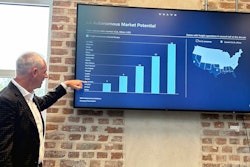UPDATE, as of 5 p.m. Central time Monday, Sept. 25: After naming a 68-mph speed setting for trucks newer than 2003 model year in the DOT update detailed in this story, FMCSA reached out to note the initial information provided in the document was inaccurate and that any specifics about the speed limiter mandate proposal still have to go through the regulatory approval process.
The DOT Significant Rulemakings report now reads that trucks equipped with an "electronic engine control unit (ECU) capable of governing the maximum speed be required to limit the CMV to a speed to be determined by the rulemaking and to maintain that ECU setting for the service life of the vehicle."
FMCSA said the 68 mph speed limit originally included in the report is one of the options being considered for the supplemental notice of proposed rulemaking that the agency is planning to publish before the end of the year, but noted that no decision has been made on the maximum speed limit that will be proposed.
Original story follows:
The U.S. Department of Transportation recently released its Report on DOT Significant Rulemakings, outlining potential timing for rules in the works at a variety of DOT agencies, including the Federal Motor Carrier Safety Administration.
For the first time, the agency signaled the speed at which it hoped to require motor carriers' speed limiters to be set: 68 mph.
As reported in DOT’s previous Significant Rulemakings report last year, FMCSA plans to proceed with a motor carrier-based speed limiter rulemaking by preparing a supplemental notice of proposed rulemaking. The new SNPRM would supersede FMCSA’s joint proposal with the National Highway Traffic Safety Administration in 2016.
FMCSA said it will propose to require truck owners or operators to set the engine control unit to a maximum speed of 68 miles per hours, according to the new report. That will apply to trucks with a gross vehicle weight or gross vehicle weight rating (GVWR) of more than 26,000 pounds, whichever is greater -- and only trucks manufactured after model year 2003.
FMCSA now plans to publish the proposal by Dec. 29, 2023.
[Related: Speed limiters: How fast is too fast?]
Among other regs highlights was a knowledge test for new entrant carriers, the mandate for automatic emergency braking systems and more.
As it does for the speed-limiter proposal, the report provides a rough timeline of when the other rulemaking proposals may be published, as well as when proposals in the works may move to their next phase, if at all. FMCSA has six other rulemakings with dates posted in the report, signifying the agency’s intent to move on them.
Automatic emergency braking systems
FMCSA is planning to publish a final rule by April 30, 2024, to require and standardize equipment performance for AEB systems on heavy trucks.
The agency, along with NHTSA, recently closed a comment period on a notice of proposed rulemaking proposing to mandate AEBs on trucks with a gross vehicle weight rating of more than 10,000 pounds. Numerous operators responded with concerns, particularly about false activations of existing systems.
[Related: Are FMCSA and NHTSA skirting Congressional directive with AEB proposal?]
Broker and freight forwarder financial responsibility
FMCSA plans to publish a final rule by March 29, 2024, to implement regulations in five separate areas related to brokers' financial responsibility: assets readily available; immediate suspension of broker/freight forwarder operating authority with claims notification; surety or trust responsibilities in cases of broker/freight forwarder financial failure or insolvency; enforcement authority; and entities eligible to provide trust funds for form BMC-85 trust fund filings.
[Related: FMCSA proposing new broker, freight forwarder financial responsibility regs]
Broker transparency
FMCSA is extending the proposed schedule for a notice of proposed rulemaking responding to requests from the Owner-Operator Independent Drivers Association and the Small Business in Transportation Coalition to provide more transparency in brokered freight transaction. OOIDA petitioned FMCSA to require brokers to provide an electronic copy of each transaction record automatically within 48 hours after the contractual service has been completed, and explicitly prohibit brokers from including any provision in their contracts that requires a motor carrier to waive its rights to access the transaction records.
SBTC requested that FMCSA prohibit brokers from coercing or otherwise requiring parties to brokers’ transactions to waive their right to review the record of the transaction as a condition for doing business, as well as to adopt regulatory language indicating that brokers’ contracts may not include a stipulation or clause exempting the broker from having to comply with the transparency requirement.
FMCSA’s new timeline is for the NPRM to be published by Oct. 31, 2024.
[Related: Owner-ops sound off to FMCSA on need for more light on brokered rates]
New Entrant knowledge test
FMCSA is planning a supplemental advance notice of proposed rulemaking (SANPRM) on the consideration of methods for ensuring a new applicant carrier is knowledgeable about the applicable safety requirements before being granted New Entrant authority. The agency is considering whether to implement a proficiency exam as part of its revised New Entrant Safety Assurance Process, as well as other alternatives. This rulemaking responds to issues raised in a petition from Advocates for Highway and Auto Safety regarding new entrant applicant knowledge.
The SANPRM is expected to be published by July 30, 2024.
Safe integration of automated driving systems-equipped commercial motor vehicles
FMCSA expects to issue a NPRM by Dec. 29, 2023, that proposes to amend certain Federal Motor Carrier Safety Regulations (FMCSRs) to ensure the safe introduction of automated driving systems (ADS)-equipped CMVs onto the nation's roadways. The proposed changes to the CMV operations, inspection, repair, and maintenance regulations will prioritize safety and security, promote innovation, foster a consistent regulatory approach to ADS-equipped CMVs, and recognize the difference between human operators and ADS, FMCSA said.
[Related: Will autonomous trucks displace drivers? Congress holds hearing on impacts]
Unified Registration System update
FMCSA plans to issue a notice of proposed rulemaking (NPRM) to implement several provisions of the Moving Ahead for Progress in the 21st Century Act (MAP-21) that relate to the FMCSA's Unified Registration System (URS), as well as update and codify the agency's procedures for granting, suspending and revoking registration.
These procedures would apply to all entities required to register under the agency's commercial or safety jurisdiction. Many of the proposed provisions codify existing FMCSA practices, while others improve on existing processes and procedures. FMCSA proposes this rule to achieve greater transparency, uniformity, efficiency and predictability with respect to granting, suspending or revoking registration.
The NPRM is expected to be published by May 30, 2024.
[Related: 'Dumbest idea I've ever heard': Owner-operators say no to speed-limiter mandate]











